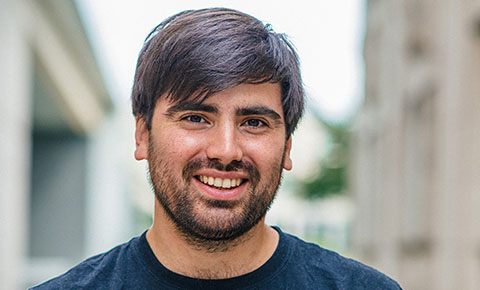Doctoral Student Wins DevSci Fellowship

Northwestern University’s Matías Martinez, a doctoral student in the Human Development and Social Policy program, received the DevSci Graduate Student Fellowship to further his research looking at how schools can prevent bullying and help kids cope with peer victimization.
“I've always been interested in how schools can affect the development of kids, not only their cognitive development, but their social, emotional development or mental health,” said Martinez, a member of professor Claudia Haase’s Life-Span Development Lab in the School of Education and Social Policy and a graduate research assistant at the Institute for Policy Research.
Born and raised in Santiago, Chile, Martinez started his academic career as an economist before earning a master’s in public policy and shifting to policy centered work.
Prior to coming to Northwestern he worked at an Institute of Public Policy in Chile and the InterAmerican Development Bank in Washington D.C., evaluating school policies related to school accountability, school finance, school choice and its impacts on student learning. This led to his interest in how social relationships at school play a big role in their learning and development.
The DevSci fellowship is designed to support students who are collaboratively researching topics in the developmental sciences. In addition to giving them the chance to build scientific bridges between different fields, it protects their research time and offers mentorship and training from experts.
“The Fellowship requires a lot of research, but they're also very interested in how to translate research into different interventions and treatments for patients,” he said.
Martinez’s research will consist of three collaborative research papers that delve into the impacts of bullying in schools.
In the first, already submitted to a journal, he explored whether being bullied is associated with different mental health outcomes, including symptoms of depression, anxiety, the early stages of psychosis, ADHD, and oppositional defiant disorder.
Martinez and his colleagues found that bullying is associated with higher symptoms for all these outcomes. Schools with environments that encourage kids to play with each other, participate in more extracurricular activities, and be more involved in school decisions, lessen the depressive symptoms experienced by kids victimized by others.
However, at these same schools that promote positive peer interactions, the kids who are victimized by others also experience higher levels of anxiety and more difficulties concentrating.
In the second paper, he focuses on whether some kids are more likely to develop depressive symptoms after being bullied by others by looking at the hippocampus, a brain region sensitive to stress. They are seeing that the larger the left part of the hippocampus, the more sensitive kids are to bullying, and that is leading them to temporarily develop higher depressive symptoms.
His last paper explores how bullying and victimization affect the mental health of kids as well as their caregivers, specifically, looking at depressive symptoms, anxiety, externalizing disorders, and antisocial behaviors. In the future, Martinez hopes to continue to do work that ultimately impacts students and makes a difference in their lives.
"Right now I'm most interested in how more resources in vulnerable schools can translate into better interventions that improve children’s development,” Martinez said. “Not only their learning, but also their socioemotional development."